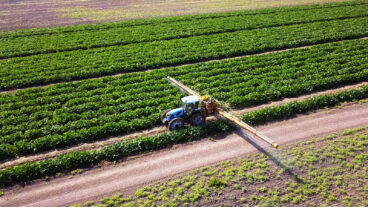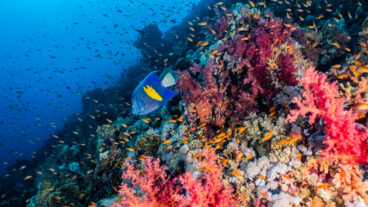The World Bank says in 20 years 3 billion people will face severe water shortages.
The Middle East is slowly mo
ving towards a more and more serious water crisis.
The world water situation is serious, but nowhere more critical than in the Middle East. The World Bank says that 300 million people – some say 500 million – today live in areas of serious to severe water shortage and in slightly more than two decades that number will grow to three billion. The smaller figure is not necessarily explosive; the larger figure is.
The United States is fortunate in having 4 percent of the world’s population and 8 percent of its fresh water, but the Metropolitan Water District of Southern California, which serves 16 million people, says that by the year 2010, it will be able to meet only 43 percent of the water needs of the population it serves from current supplies. So, even in water-rich nations, distribution causes a problem.
There is more complete data on Israel’s water situation than on Jordan, Syria and the Palestinian territory – all of which face even more severe difficulties – but in Israel the status is deteriorating with problems of distribution, water quality and water quantity. All three are interrelated, but the most pressing of the three is quantity. In 1973, when the water situation was not as critical as it is today, current Israeli Prime Minister Ariel Sharon referred to the Six-Day War as the Water War, because a water dispute between Syria and Israel was the immediate cause.
The three main sources of water for Israel are the Sea of Galilee (Lake Kinneret), the coastal aquifer and the mountain aquifer. Anyone who has been to Israel recently can testify to the highly visible reduction in water of the Sea of Galilee (as well as the Dead Sea). Unfortunately, not visible is the gradual decline of water in the two large aquifers, which not only threatens the supply in Israel, Jordan and the Palestinian territory, but, because of the reduction in the quantity of water, there is saline and other chemical penetration that’s causing a decline in water quality.
Israeli citizens use less than 40 percent as much water per capita in urban areas as do people in Southern California. Israel’s neighbors use much less. Former Israeli Water Commissioners Manahem Kantor and Dan Zaslavsky have warned that Israel’s water situation will become much worse unless carefully planned steps are taken immediately. What is grim for Israel is even more severe for her neighbors.
Agriculture in all four lands is already largely dependent on recycled low-grade water. And the simple solution of diverting more of this to urban needs is technically difficult and opposed by the area governments that do not want to become totally dependent on foreign sources for food.
An adequate, quality supply of water for citizens of all four countries is absolutely essential to maintaining the quality of life for their people. The last thing Israel needs is an exodus of citizens because the problems of water are piled on top of other difficulties, lowering their standard of living.
The Jordanians, Palestinians, and Syrians will face the same problems, but their citizens are somewhat less mobile than Israel’s.
Complicating this precarious situation is that if the hoped-for agreement with Israel and the Palestinians on land is achieved – not an immediate prospect – inevitably that means granting a sizable portion of Israel’s water sources to her neighbors.
Is the situation hopeless? No. But three things have to happen:
1. Some type of regional agreement on water must accompany the uneasy peace that I believe will eventually be reached. No nation in that region can solve the water problems by itself, with the possible exception of Lebanon. Last year I went to Jordan and Syria at the request of the State Department to meet with leaders in those two nations to try to get them to move toward a regional agreement on water with Israel and the Palestinians. My trip caused at least serious reflection on the need for regional cooperation. The problem is becoming grim. Amman, the capital of Jordan, with one million people, permits its citizens to turn on their taps one day a week – and Jordan’s population will grow by about one -third over the next decade. However, regional cooperation on water will have to wait until hostilities diminish.
2. Immediate, short-term answers must be found. That will include purchasing large plastic bags of water (each 5.6 million gallons) from Turkey. It must include more reservoirs, which the Jewish National Fund is helping to provide for Israel that will also assist in the long term.
3. Desalination from seawater is recognized by almost everyone as the big long-term key. Two large plants are in the offing for Israel. Jordan is moving in this direction. Eventually Syria will have to. And for the Palestinians it is urgent as soon as they have stability. Much more desalination will be needed. Saudi Arabia has more desalination plants than any nation, but they have cheap energy. The Saudis have moved from growing as little as 8 percent of their own food to today being a food exporter. Any visitor to Israel and Jordan over a period of years has seen desert areas become productive with the application of water. But research by the United States on finding less-expensive ways of converting salt water to fresh water would be of great help to the Middle East, as well as to ourselves.
Israel’s Foreign Minister Shimon Peres often says that water will be a catalyst for war or a catalyst for peace. He is correct, and if the situation can become more stable, getting the nations to work together on water can lead to greater cooperation on other matters.












